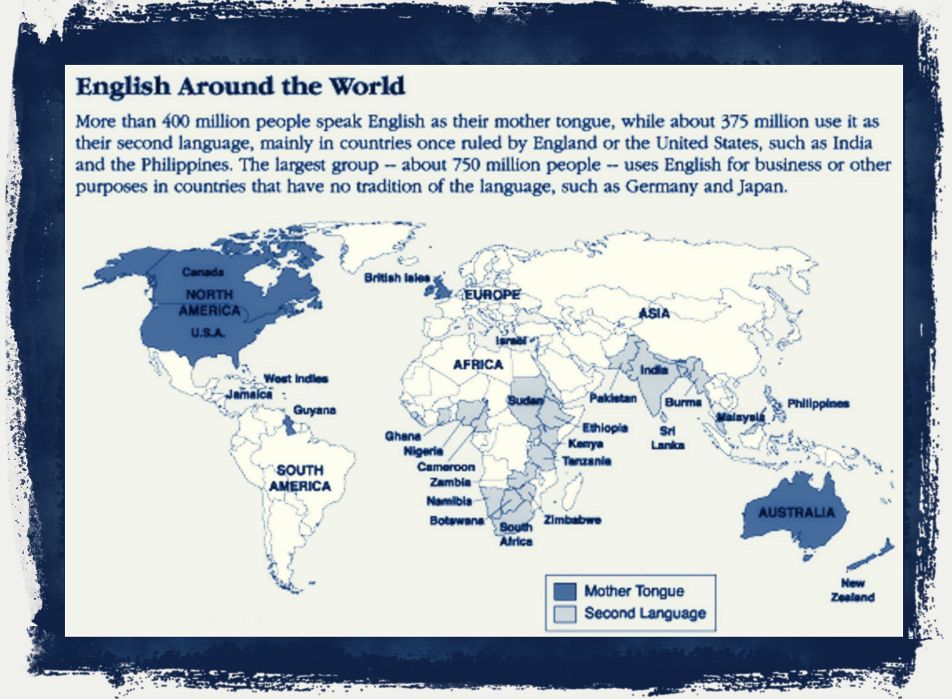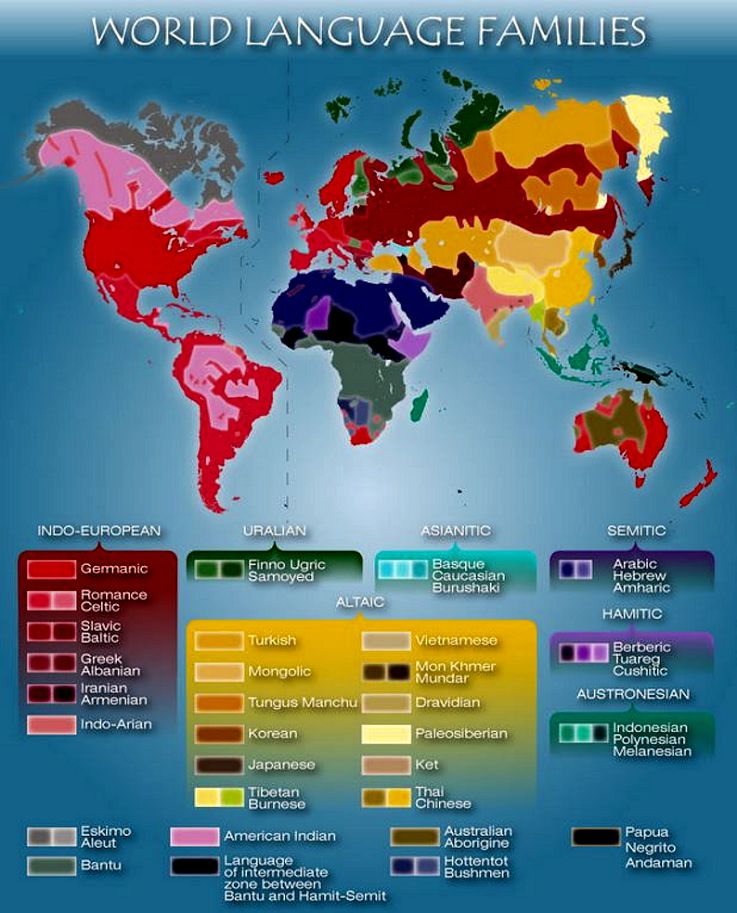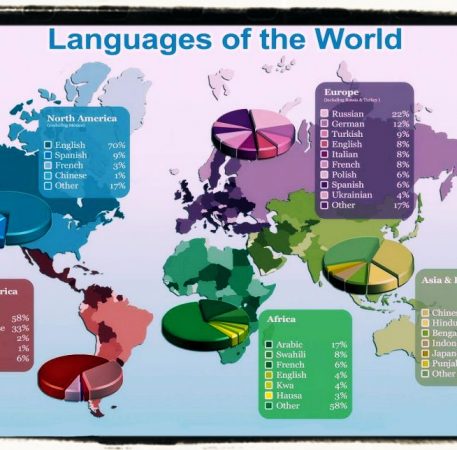
1st language 2nd language
Mandarin Chinese 850 million —
English 425 million 1 billion
Hindu 400 million 125 million
Spanish 390 million 70 million
Arabic 272 million 24 million
Indonesian 222 million 15 million
Portuguese 210 million 20 million
Bengali 194 million 20 million
Russian 145 million 110 million
Japanese 130 million —
No. of languages spoken in the world: 6,912
A global language
We all live in a small unique world, that’s why we need at least one sole common language. Carl William Brown

English around the world – Facts & Figures
• English is the first language in 36 countries.
• It is the second language in 34 countries.
• 89% of schoolchildren in the EU study English as a foreign language.
• English is the most commonly used language in science: 95% of all scientific articles are written in English.
• English is the international language of business, finance, marketing, economics, trading, politics and diplomacy. It’s one of the official languages of the European Union, United Nations and the International Olympic Committee.
• English is the official language of air traffic control, sea navigation and space travel.
• Because of the global spread, a lot of English dialects and English-based languages have developed around the world. These are often referred to as creole languages and pidgins. Examples include Jamaican Creole and Nigerian Pidgin.

Will English be the global language forever? Will English become the eternal global language? Or is it destined to die out like Latin?
Whether or not English will always remain the global language is a question of debate for historians and linguists. David Crystal, author of the book English as a Global Language, thinks that it will. He claims that English dominates communication in a way that no other language has ever been able to do before. It is not only the language of the Web, but also of science, of air traffic and even of war.
English is continually changing. And perhaps that is the key to its future. In the past, the various invasions of Britain all influenced the language. The English speaking populations of British colonies also had their influence. The result is a flexible and elastic Ianguage with the ability to adapt words, create new words and borrow words from other languages. New words enter the English language all the time. The exact number is uncertain but thousands are appearing every year.

Historian Nicholas Ostler, however, has a different opinion. He says: “Halfway through the fifteenth century in Europe the future of Latin looked extremely bright. And look what happened to that.” And even if English remains the global language, the triumphant Anglo-Saxons will have to remember that there’s always another side to the coin. A journalist for the New York Times points out: “The world is flat: today an Indian graduate is able to do the same job as his American contemporary for half the price and in the same language… Think well before choosing the university for your children. In a few years’ time, a lot of occupations in the west will no longer exist.”
And perhaps Latin has the last word after all. Behind the bar of a tiny café in Madison Avenue, New York, there is a Latin inscription: “Non scholae sed vitae discimus” – We learn for life not for school. The owner, a Hungarian, says: “In Budapest if you wanted to become a lawyer, a teacher or a doctor you had to study Latin for five years. For me it’s still the universal language. I haven’t forgotten any of it.”
If you can’t learn English, try Globish
It happens all the time: during an airport delay the man to the left, a Korean, starts talking to the man opposite, who is perhaps Colombian. Soon they start chatting in a language that seems to be English. But the native English speaker sitting between them cannot understand a word.
They don’t know it, but the Korean and the Colombian are speaking a form of Globish, the latest addition to the 6,800 languages that are spoken around the world. Globish was invented by a Frenchman, Jean-Paul Nerrière. Nerrière is quick to point out that it is not a proper language. “It’s not a language. It’s a tool,” he says. “A language is the vehicle of a culture. Globish doesn’t want to be that. It is just a means of communication.”

The main principles of Globish are a vocabulary of only 1,500 words in English (the Oxford English Dictionary lists 615,000), plus gestures and repetition. The point” says Nerrière is to reach the threshold of understanding.”
The idea for Globish came from the 1980s when Nerrière worked for IBM in Paris with colleagues of about 40 nationalities. At a meeting where they were waiting to be addressed by two Americans, they started talking in what Nerrière calls “une certaine forme d’anglais perverti”. Then the Americans arrived and after their opening phrases “Call me Jim,” “Call me Bill,” no one understood a word. Neither did Jim or Bill understand the perverted English.
Nerrière sees a great future for Globish, which he has trademarked. He has written a book Parlez Globish and, since its publication, his Website has had many thousands of visitors. He claims that, with 82 hours of study, a student should be able to communicate in Globish, but he repeats that it is nothing but a tool to use when the proper language is not understood. “It is not the language of Hamlet, Faulkner or Virginia Woolf,” he explains.
Find out more about the languages of the world visiting these links:

